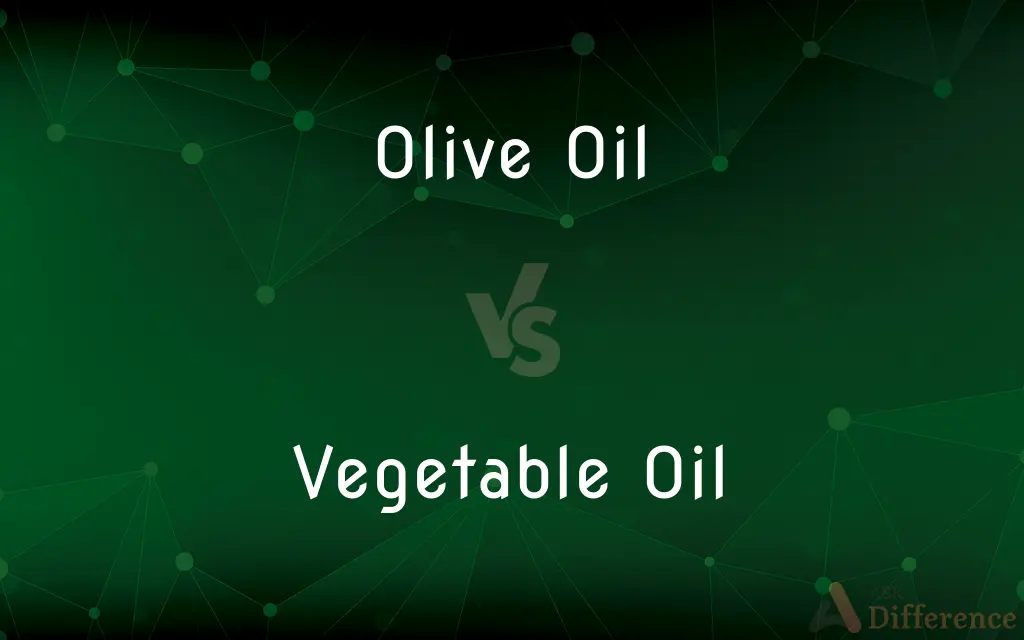Olive Oil vs. Vegetable Oil — What's the Difference?
By Tayyaba Rehman — Published on January 2, 2024
Olive Oil is a monounsaturated fat from olives, rich in antioxidants and flavor. Vegetable Oil is a blend of various plant-based oils, often neutral in taste and versatile for cooking.

Difference Between Olive Oil and Vegetable Oil
Table of Contents
ADVERTISEMENT
Key Differences
Olive Oil is extracted from olives, offering a distinct taste often associated with Mediterranean cuisine. Vegetable Oil, conversely, is a generic term for oils extracted from various plants, including soybean, corn, and canola, and is known for its neutral flavor.
Rich in monounsaturated fats, Olive Oil is often touted for its health benefits, including heart health. Vegetable Oil can be a mix of different types of fats, and its health impact varies depending on the source and processing methods.
Olive Oil is available in several varieties, such as extra virgin and light, each with unique flavor profiles and cooking uses. Vegetable Oil, in comparison, is more uniform in taste and is a common all-purpose oil in various cooking methods.
The production of Olive Oil is typically more specialized, focusing on the quality and origin of the olives. Vegetable Oil production is more industrial, often involving a mix of different plant sources and more extensive processing.
Olive Oil is renowned for adding a rich flavor to dishes, especially in dressings and for low to medium-heat cooking. Vegetable Oil, being more heat-stable and neutral in taste, is often preferred for high-heat cooking like frying.
ADVERTISEMENT
Comparison Chart
Source
Extracted from olives
Blend of various plant-based oils
Fat Type
High in monounsaturated fats
Varies, often includes polyunsaturated and saturated fats
Flavor
Distinct, varies by type
Generally neutral
Cooking Use
Dressings, low/medium heat cooking
Versatile, suitable for high-heat cooking
Health Benefits
Rich in antioxidants, heart-healthy
Depends on the blend, less specific health benefits
Compare with Definitions
Olive Oil
A healthy oil derived from the pressing of olives.
She drizzled Olive Oil over her salad for a flavorful boost.
Vegetable Oil
Contains a mix of different types of fats, including polyunsaturated.
Vegetable Oil is a staple in many pantry essentials.
Olive Oil
Rich in monounsaturated fats, beneficial for heart health.
His doctor recommended Olive Oil for a healthier diet.
Vegetable Oil
Less specific in health benefits compared to oils like olive oil.
He chose Vegetable Oil for its versatility, though it lacked specific health benefits.
Olive Oil
Often used in low to medium-heat cooking and dressings.
Olive Oil enhanced the flavors in her sautéed vegetables.
Vegetable Oil
Known for its neutral taste, making it versatile in the kitchen.
She used Vegetable Oil for frying due to its neutral flavor.
Olive Oil
A staple in Mediterranean cuisine, known for its distinct taste.
Olive Oil is essential in authentic Italian cooking.
Vegetable Oil
Often used in high-heat cooking methods like frying.
Vegetable Oil's high smoke point makes it ideal for deep-frying.
Olive Oil
Available in varieties like extra virgin, known for its purity and flavor.
For her dressing, she used extra virgin Olive Oil.
Vegetable Oil
A blend of oils extracted from various plants, like soybean or corn.
Vegetable Oil is a go-to for diverse cooking needs.
Common Curiosities
What is the flavor profile of Vegetable Oil?
Vegetable Oil generally has a neutral taste.
Can Olive Oil be used for high-heat cooking?
Olive Oil is best for low to medium-heat cooking; high heat can affect its flavor.
What is Olive Oil made from?
Olive Oil is made from pressed olives.
What dishes are best with Olive Oil?
Olive Oil is great in dressings, marinades, and for flavoring dishes.
What types of fat does Vegetable Oil contain?
Vegetable Oil can contain a mix of polyunsaturated, monounsaturated, and saturated fats.
Are there different types of Olive Oil?
Yes, including extra virgin, virgin, and light olive oil, each with varying flavors.
What are common uses of Vegetable Oil in cooking?
Vegetable Oil is used for frying, baking, and as a general cooking oil due to its neutral taste.
Is Vegetable Oil a specific type of oil?
No, it's a general term for a blend of plant-based oils.
Is Olive Oil good for dressings?
Yes, its rich flavor makes it ideal for dressings.
Is Olive Oil considered healthy?
Yes, Olive Oil is known for its heart-healthy monounsaturated fats.
What's the main difference in health benefits between the two oils?
Olive Oil is richer in antioxidants and monounsaturated fats.
Can Vegetable Oil be used in baking?
Yes, its neutral taste makes it suitable for baking.
What's the smoke point of Vegetable Oil?
Vegetable Oil generally has a high smoke point, suitable for frying.
Can I substitute Olive Oil for Vegetable Oil in recipes?
Yes, but it may change the flavor profile of the dish.
Does the quality of Olive Oil vary?
Yes, the quality can vary greatly, especially between extra virgin and more processed types.
Share Your Discovery

Previous Comparison
Whole Grain vs. Whole Wheat
Next Comparison
Odd Numbers vs. Even NumbersAuthor Spotlight
Written by
Tayyaba RehmanTayyaba Rehman is a distinguished writer, currently serving as a primary contributor to askdifference.com. As a researcher in semantics and etymology, Tayyaba's passion for the complexity of languages and their distinctions has found a perfect home on the platform. Tayyaba delves into the intricacies of language, distinguishing between commonly confused words and phrases, thereby providing clarity for readers worldwide.
















































